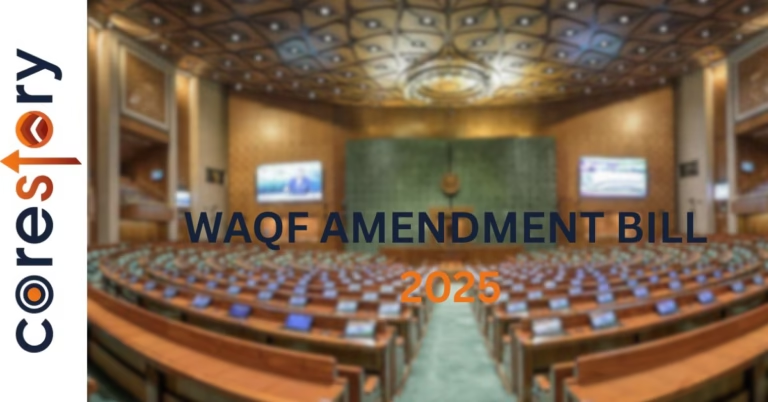
On April 3, 2025, the Lok Sabha passed the Waqf (Amendment) Bill 2025, a significant legislative move aimed at reforming the management of Waqf properties in India. The bill secured approval with 288 members voting in favor and 232 against. Alongside this, the House also greenlit the Mussalman Wakf (Repeal) Bill 2024, effectively nullifying the Mussalman Wakf Act of 1923. These developments mark a pivotal shift in how Waqf properties are governed, sparking widespread debate across political lines.
Also Read: The Rise of Tier-2 City Startups in India: A New Frontier Beyond Metros
Union Minority Affairs Minister Kiren Rijiju introduced the Waqf (Amendment) Bill 2025 in the Lok Sabha, emphasizing that the legislation focuses solely on Waqf Board properties and does not interfere with Muslim religious practices or mosque management. “This bill is about inclusivity and secularism,” Rijiju stated, clarifying that it is prospective, not retrospective, and has no intent to seize anyone’s property. He highlighted that the Waqf (Amendment) Bill 2025 ensures representation of diverse Muslim sects and women on Waqf Boards, aiming to enhance transparency and fairness.
Rijiju criticized past amendments made during the UPA regime in 2013, claiming they granted excessive powers to Waqf Boards, including the transfer of 123 prime properties in Delhi to the Delhi Waqf Board. “Why do Indian Muslims remain poor despite India having the highest Waqf properties globally?” he questioned, underscoring the need for the Waqf (Amendment) Bill 2025 to address mismanagement and misuse of these assets.
The bill’s passage followed extensive discussions by the Joint Parliamentary Committee (JPC), which consulted stakeholders to refine its provisions. Rijiju also moved the Mussalman Wakf (Repeal) Bill 2024, signaling a comprehensive overhaul of outdated Waqf-related laws.
Opposition’s Critique of the Waqf (Amendment) Bill 2025
The opposition fiercely contested the Waqf (Amendment) Bill 2025. Congress MP Gaurav Gogoi labeled it unconstitutional, accusing the government of using the legislation to undermine minorities and divide society. He refuted Rijiju’s claims about property transfers during Congress rule, warning that the bill could exacerbate existing issues rather than resolve them.
Samajwadi Party leader Akhilesh Yadav echoed these sentiments, alleging that the Waqf (Amendment) Bill 2025 was a distraction from the government’s failures on inflation, unemployment, and demonetization. He also raised concerns about its impact on India’s secular image, questioning the BJP’s motives.
TMC MP Kalyan Banerjee called the bill “misconceived and arbitrary,” arguing that it curtails the Muslim community’s rights. Similarly, DMK’s A Raja deemed it anti-minority and unconstitutional, predicting harm to Muslim interests.
Samajwadi Party’s Mohibbulah further claimed that the Waqf (Amendment) Bill 2025 violates fundamental rights to equality and religion, accusing the government of stripping the Waqf Board of its autonomy.
Government’s Defense and Support
Union Home Minister Amit Shah robustly defended the Waqf (Amendment) Bill 2025, dismissing opposition claims as fearmongering aimed at vote-bank politics. “No non-Muslim will manage Waqf institutions,” Shah clarified, addressing misconceptions about the bill’s intent. He blamed the Congress-led UPA’s 2013 amendments for necessitating this reform, accusing them of handing over valuable Lutyens Delhi properties for political gain before the 2014 elections.
BJP’s Ravi Shankar Prasad supported the bill, stressing that it promotes gender justice and transparency by mandating women’s inclusion in Waqf Boards. “This country belongs to Muslims as much as it does to Hindus,” he said, urging the opposition to view the Waqf (Amendment) Bill 2025 holistically.
TDP’s Krishna Prasad Tenneti endorsed the legislation, noting that Waqf properties—valued at 1.2 lakh crore rupees and spanning 36 lakh acres—hold immense potential for minority upliftment. He argued that the Waqf (Amendment) Bill 2025 addresses their underutilization and mismanagement.
JD(U) leader Rajiv Ranjan Singh dismissed anti-Muslim allegations, asserting that the bill ensures justice for all Muslim sections through transparent property management. Meanwhile, Shiv Sena’s Shrikant Shinde hailed it as the “Unified Waqf Management Empowerment, Efficiency and Development (UMEED)” initiative, promising progress for minorities.
Dissent Within the JPC
Shiv Sena (UBT)’s Arvind Sawant, a JPC member, criticized the process behind the Waqf (Amendment) Bill 2025, alleging incomplete clause-by-clause discussions. He accused the government of inconsistency between its promises and actions.
The passage of the Waqf (Amendment) Bill 2025 and the repeal of the Mussalman Wakf Act 1923 signal a transformative moment for Waqf property governance in India. While the government touts it as a step toward inclusivity and efficiency, the opposition warns of its potential to erode constitutional values and minority rights. As debates continue, the bill’s long-term impact remains a subject of intense scrutiny.
- India’s Push to Become a Global Semiconductor Innovation Hub: Can It Succeed?
- Dr. Laila Mintas Joins Board of Rules X, Operating Partner of European T20 Premier League
- Q-Commerce Rider Experience Gets Real – Aum Vats (@aumvats) Breaks It Down
- Lok Sabha Passes Waqf (Amendment) Bill 2025: Key Details and Reactions
- The Rise of Tier-2 City Startups in India: A New Frontier Beyond Metros




